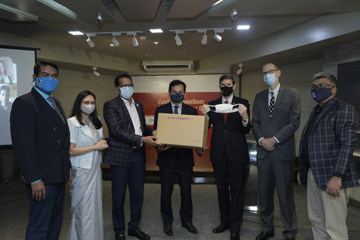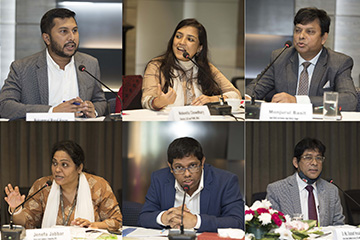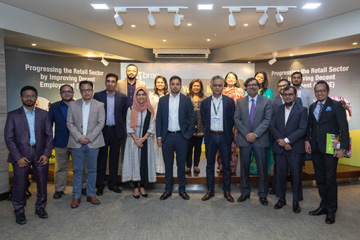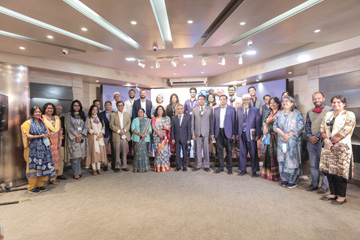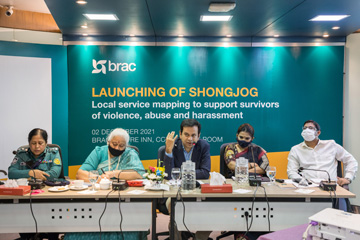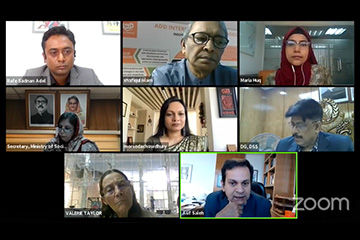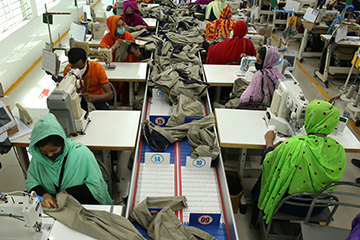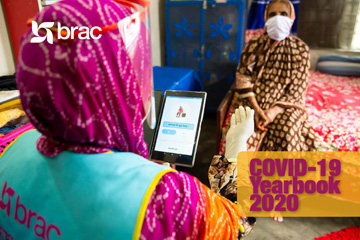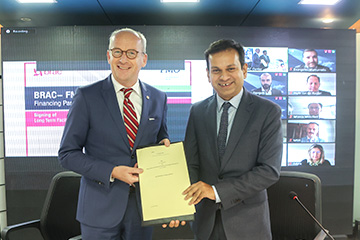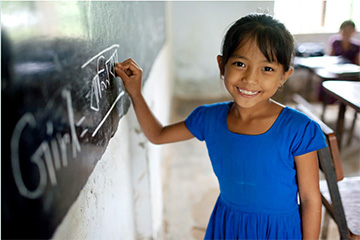
English (959)
Children categories
BRAC receives 56 million cloth masks From US multinational Hanesbrands
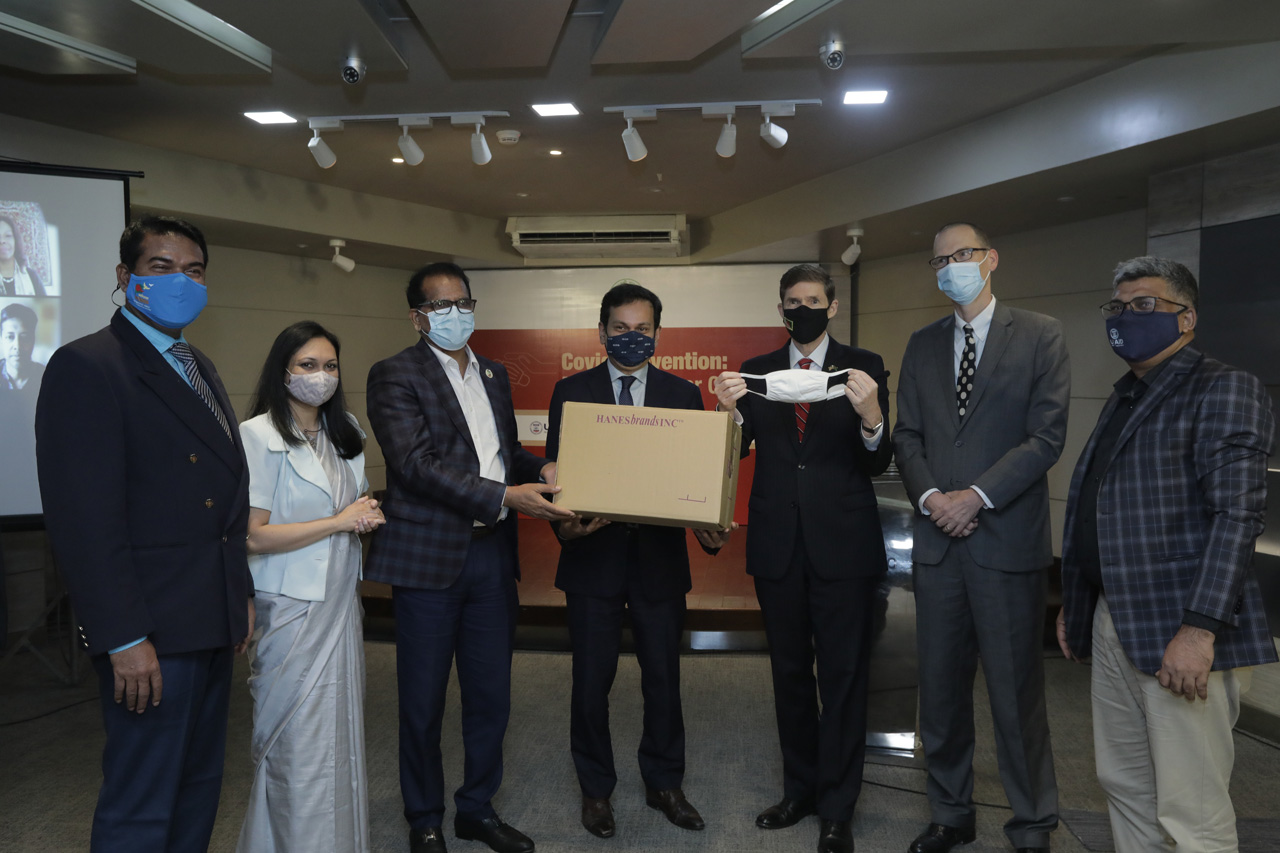
Distribution will be made among most vulnerable communities across country
As Bangladesh braces for a probable new wave of Covid-19, exacerbated by the Omicron variant, BRAC has received a bulk of 56 million three layered reusable cotton masks from Hanesbrands Inc., a US multinational corporation. The masks will be distributed among the most vulnerable people in all the 64 districts through community clinics.
Earl R Miller, US Ambassador to Bangladesh, formally handed over the masks to Asif Saleh, executive director of BRAC, at a ceremony at the BRAC Centre in the capital this evening (Thursday 06 January).
Lokman Hossain Miah, senior secretary to the Health Services Division, Ministry of Health and Family Welfare, attended the event as the chief guest with KM Tariqul Islam, director general, NGO Affairs Bureau, and Earl R Miller, US Ambassador to Bangladesh, being present as special guests.
US-based funding organisation the Open Society Foundation (OSF) and Yale University jointly coordinated the initiative to deliver the masks to BRAC.
Senior secretary Lokman Hossain Miah congratulated BRAC, Hanesbrands and other entities involved in this “great” initiative, and said, “There are two major ways to tackle transmission of Covid-19 at present. One is to ensure the wearing of masks by people including rickshaw-pullers, street vendors and day labourers who are constantly on the move for their livelihoods, and the other is vaccination. So it’s imperative that we make facemasks easily available to these people.”
US ambassador Earl R Miller at the ceremony said, “BRAC, the Government of Bangladesh, the American private sector and the US Embassy are working together to provide over 56 million masks to the Bangladeshi people donated by Hanesbrand, the American clothing company based in North Carolina. By heeding the lessons of science and history and through collaborative efforts like these, together, as a global community, we will defeat this pandemic.”
NGO Affairs Bureau director general KM Tariqul Islam said, “This bulk of masks will greatly help our vulnerable communities continue their fight against the pandemic. BRAC will distribute these masks across the country through the government’s community clinics network.
The BRAC executive director thanked the US government, Hanesbrands, Open Society Foundation (OSF) and Yale University for mobilising the donation and said, “Making masks available and accessible for all is crucial in the fight against Covid-19. We have seen significant success in mass vaccination in high-risk areas in Bangladesh, but additional preventive measures such as wearing masks are still vital. This donation will allow us to scale up our preventative efforts, and ensure that we can get free masks to the people who need them the most. We are extremely grateful to have support from multiple partners, which in addition to providing resources, provides us with encouragement that we are not in this fight alone.”
Strengthening the public prosecution system to ensure justice for sexual and gender-based violence

On 8 December 2021, BRAC's gender justice and diversity programme, with the support of BRAC’s social empowerment and legal protection (SELP), organised a roundtable discussion on ‘Strengthening the public prosecution system to ensure justice for sexual and gender-based violence’ in solidarity with the 16 Days of Activism 2021.
The discussion focused on identifying the best practices and potential solutions which can overcome key weaknesses in the public prosecution system in order to ensure justice in cases of violence against women and girls. Therefore it brought together key actors from all stages of the public prosecution system, such as police officers, forensic doctors, public prosecutors, legal aid lawyers, judges, along with government and non-government service providers, development partners and activists.
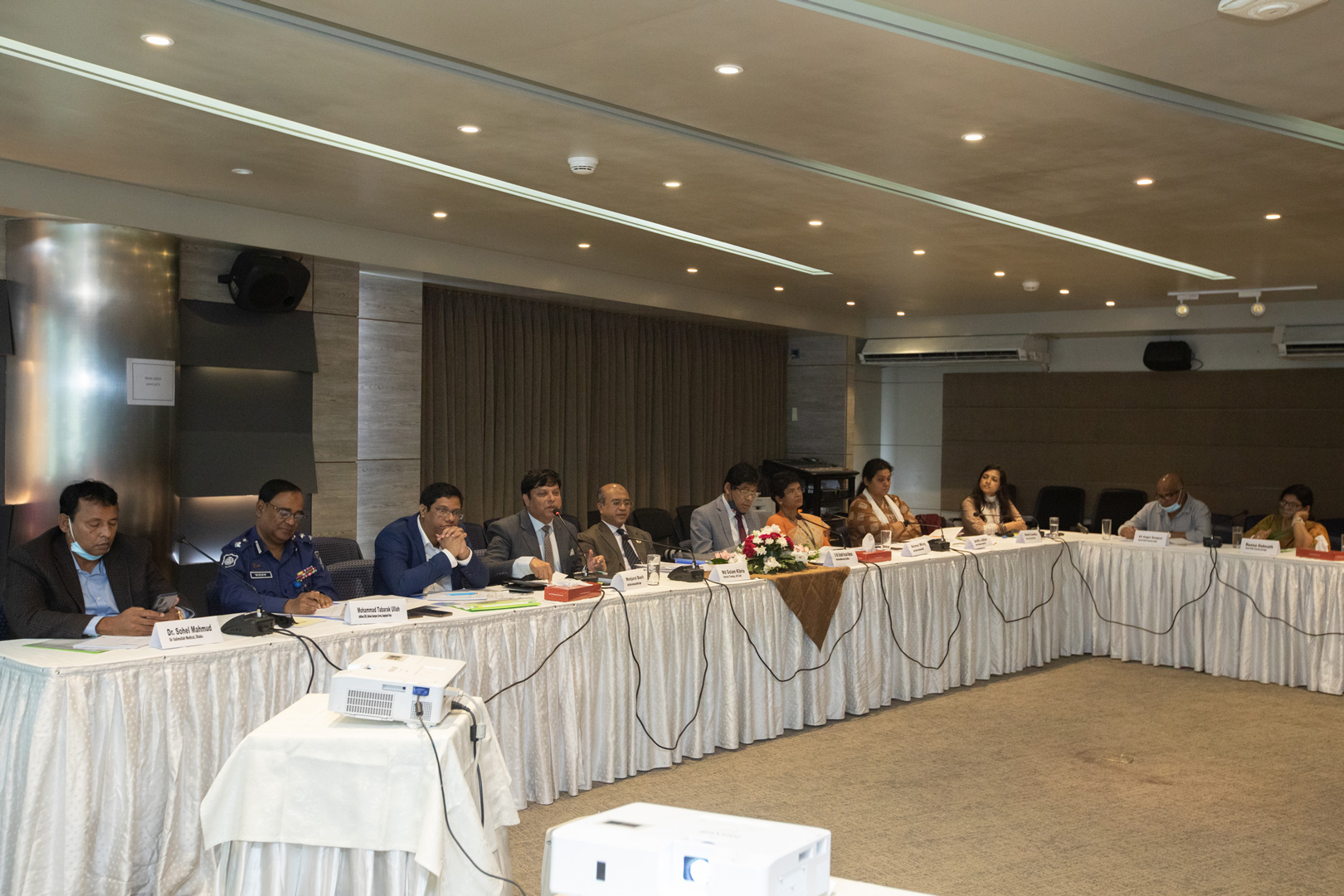
The discussants at the event included: Md Golam Kibria, Director (Training), Judicial Administration and Training Institute (JATI); Anna Minj, Director, Integrated Development Programme; Advisor, SELP and Protection Cluster, HCMP, BRAC; Jenefa Jabbar, Advocate, Supreme Court of Bangladesh; Director, Social Compliance and Safeguarding, BRAC; Nobonita Chowdhury, Director, Gender Justice and Diversity, and Preventing Violence Against Women Initiative, BRAC; Dr Md Shahadat Hossain Mahmud, Director General (Additional Secretary), Health Economics Unit, Ministry of Health and Family Welfare; Md Habibur Rahman Chowdhury, Deputy Director (Finance), Joint District and Sessions Judge, National Legal Aid Services Organization, Law and Justice Division, Ministry of Law, Justice and Parliamentary Affairs; Mohammad Tabarak Ullah, Additional Deputy Inspector General (DIG) of Police, National Emergency Service, Bangladesh Police; Ali Asgor Swapon, Special Public Prosecutor, Nari O Shishu Nirjaton Domon Tribunal Tribunal, Dhaka; Reena Debnath, Special Public Prosecutor, Nari O Shishu Nirjaton Domon Tribunal Tribunal, Narsingdi; and Dr Sohel Mahmud, Head, Department of Forensic Medicine, Sir Salimullah Medical College. Family members of a rape survivor and acid violence survivor also spoke at the event, highlighting the challenges and hurdles they faced when seeking justice.
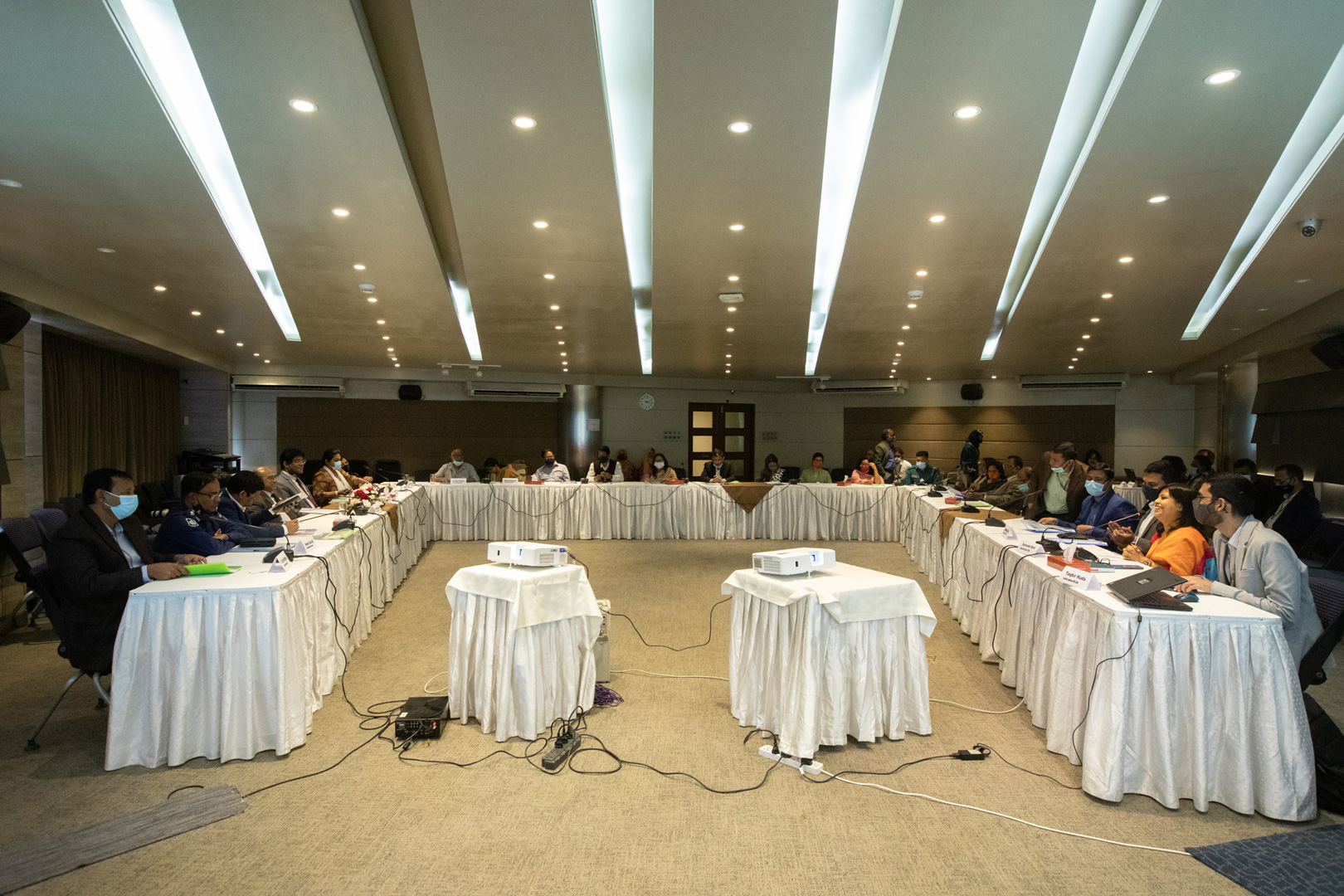
The discussants highlighted the necessity of a number of reforms, including the need to: introduce a victim and witness protection system, incorporate virtual court system in Nari O Shishu Nirjaton Domon Tribunals, ensure gender sensitisation training for justice sector actors (such as judges and public prosecutors) and introduce a compensation scheme for survivors. The discussants also stressed the need to increase budgetary allocation for the public prosecution system and support services for survivors, such as by appointing more judges and prosecutors and establishing One Stop Crisis Centres and shelter homes in every district. All discussants acknowledged the necessity of jointly working together towards strengthening the public prosecution system to ensure justice for survivors of sexual and gender-based violence.
Opportunities to enhance youth employment in retail sector
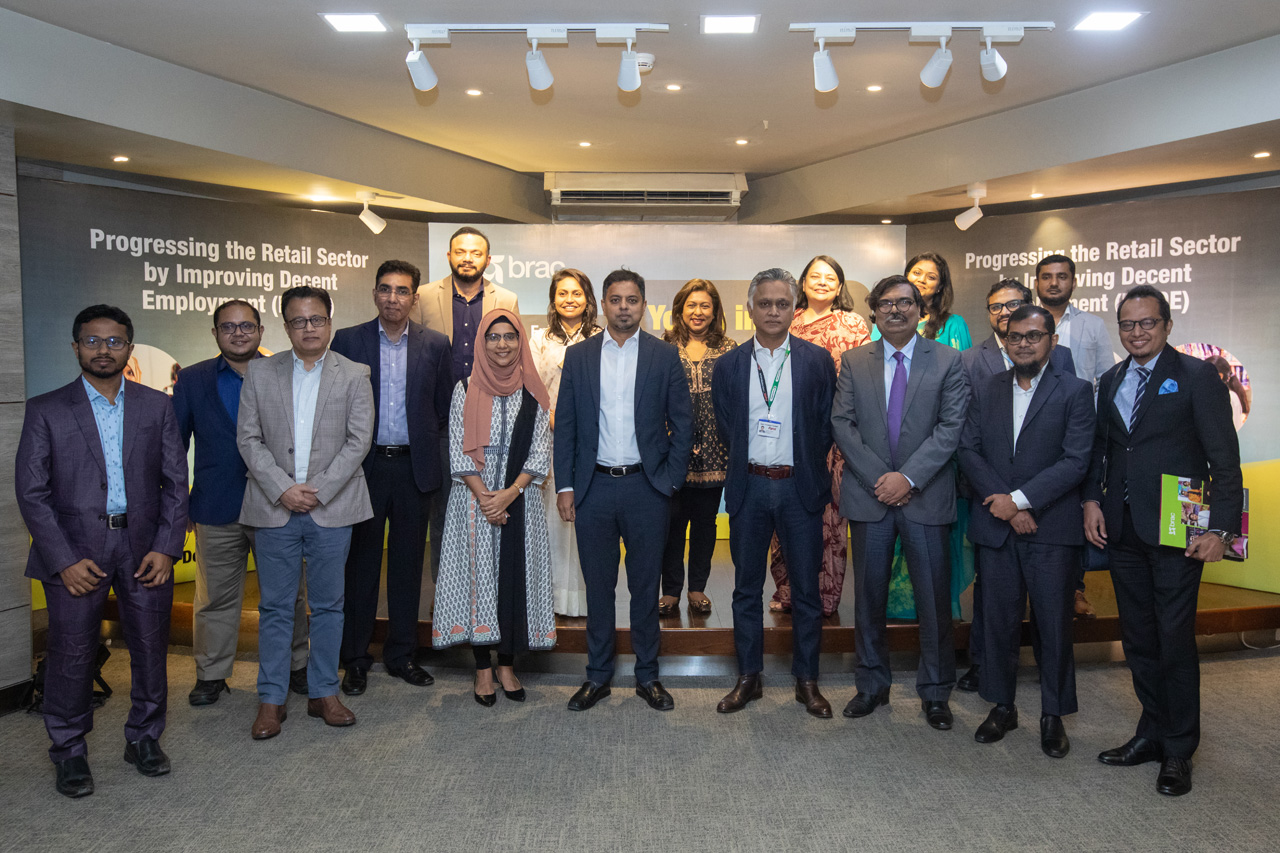
The retail sector of Bangladesh has already employed over six million (60 lakh) people. The sector has much growth potentials and will create employment opportunities for many more youths particularly women from the disadvantaged sections of the society in the coming years. Speakers came up with the observation while addressing a roundtable discussion on “Enhancing employment: Opportunities for youth in Bangladesh’s retail sector” organised in Dhaka today on Thursday.
The event, organised by BRAC’s Skills Development Programme (SDP) at the BRAC Centre this morning, aims to foster discussions with the private sector on youth employment in retail sales and skills training required for the jobs and advocate women and persons with disabilities inclusion in the retail industry.
Nihad Kabir, president, Metropolitan Chamber of Commerce and Industry (MCCI) was present as the chief guest at the event. Speakers at the roundtable, among others, were Tamara Abed, managing director of Aarong, BRAC, Syed Nasim Manzur, MD of Apex Footwear Ltd, Murtoza Zaman, chief executive officer of Unimart, Tanvir Sohel Khan, business director of Shwapno, Shaheen Khan, chief executive officer of Gemcon Food and Agricultural Products Ltd, Nure Alam Shimu, Managing Director of Gadget and Gear, M.M. Ferdous, Executive Director of Best Electronics, Mosaraf Hossain, Chief Operating Officer of Mirror Outfitters, Rubaiyath Sarwar, Managing Director of Innovision Consulting Ltd, Aziza Ahmed, head of operations of Bangladesh Business and Disability Network, Masudul Haq, MD of Amanah Group, Maria Huq, director of BRAC, Tasmiah Tabassum Rahman, Current in-charge, BRAC Skills Development Programme, and Joydeep Sinha Roy, Head of Operations, BRAC Skills Development Programme.
Considering the prospect of job creation in this sector, BRAC’s SDP is implementing a project titled “Progressing the retail sector by improving decent employment (PRIDE)”. The project aims to create a model for scale, providing sustainable livelihoods for low-income urban youths in Bangladesh in partnership with the retail sector and the Government of Bangladesh.
The retail sales project, funded by IKEA Foundation and UBS Optimus Foundation, aims to impact changes in the retail sector by providing decent work opportunities for disadvantaged urban youth, particularly women and persons with disabilities. It also supports industry standardisation in major cities like Dhaka, Khulna, Chattogram and Sylhet.
MCCI president Nihad Kabir in his chief guest’s speech said, “Women essentially need training to enter jobs in the retail sector. But at the moment training facilities for the aspirants are very limited. The government should focus on establishing these facilities.”
MD of Aarong Tamara Abed said, “It lies with us the employers to create decent work environment for both men and women at the workplace. There should be a continuous effort to make workplace environment more comfortable and healthy. There should also be sexual harassment prevention policies at place. Businesses should have separate washrooms and shift-based work schedule not only for women staff, but for the persons with disabilities also.”
Apex Footwear MD Syed Nasim Manzur observed, “It’s not only sufficient to organise training and employment in the retail sector, but quality improvement of the sector is also imperative. The government needs to play a decisive role in formulating necessary laws and giving recognition.”
Gemcon Food CEO Shaheen Khan said, “It’s a highly conventional idea that women cannot work as hard men. The women retailers in Bangladesh have proved their ability. We want more women in retailing. We have policy of inclusion in our business.”
Though the retail industry contributes significantly to Bangladesh’s Gross Domestic Product (GDP), opportunities for formal training hardly exists in the country for those looking for jobs in this sector. A baseline survey conducted in 2020 showed that a very low percentage of retailers provide formal training for their employees.
BRAC SDP, in collaboration with Bangladesh Technical Education Board has developed the country’s first accredited retail sales training module. Following this module SDP is currently providing training to those participating in its own training courses. Since the training began 54% of its participants are currently employed despite having no prior experience and the Covid-19 situation.
The retail industry in Bangladesh is male dominated with only 8% females. Retailers are reluctant to hire female staff citing safety issues and due to a pervasive perception that women cannot take physical strain. In the baseline survey, more than 50% of the respondent persons with disabilities stated they were not provided with specialised orientation although they had no previous work experience.
Retailers who did not hire persons with disabilities stated a number of reasons, the major ones among them are - the nature of business was not suitable, lack of accommodation at the workplace, and no applications received from aspirant persons with disabilities.
Tackling impact of Covid-19 on girls and young women Skills training in informal sector stressed

More than 50 million (5 crore) people involved in the country’s informal sector have borne the brunt of the Covid-19 pandemic. Women and adolescent girls engaged in this sector still suffered the worst of all. Participation in the labour market through effective skills training should be a high priority to assist them in recovering the situation. Speakers expressed these views at a discussion organised by BRAC’s Skills Development Programme (SDP) today on Thursday (2 December) at the BRAC Centre at Mohakhali in the capital.
K M Tarikul Islam, director-general, NGO Affairs Bureau, attended the event titled “Tackling Covid-19 adversities on girls and young women through skills training in the informal sector” as chief guest. Md Abul Kalam Azad, former principal coordinator (SDG affairs) at the Prime Minister’s Office was present as the special guest.
AFM Shahidur Rahman, director, Programme Development-Asia, PRL and Monitoring Department, BRAC, delivered the welcome speech, followed by a keynote presentation by Nobonita Chowdhury, director, Gender Justice & Diversity and Preventing Violence Against Women Initiative, BRAC, on the current state of girls and young women in the informal sector. Tasmiah Tabassum Rahman, in-charge, Skills Development Programme, BRAC, and Dr Narayan Chandra Das, senior research fellow, BRAC Institute of Governance and Development (BIGD), gave another presentation on “Skills interventions for mitigating risks on girls and young women - skills training for advancing resources (star), an apprenticeship-based skills training model”.
Veera Mendonca, deputy representative, UNICEF Bangladesh, Shahriar Islam, senior programme manager, Australian Department of Foreign Affairs and Trade, and Mirza Nurul Ghani Shovon honoured as Commercially Important Person status by the government, chairman, Informal Sector Industry Skills Council, spoke as panel speakers.
The speakers observed that the informal sector has been the worst affected in terms of the country’s labour market. The situation has its direct impact on the people involved in the sector, risking the livelihood of 52 million (5 crore 20 lakh) people. Women are the worst sufferer as nearly 91.8 per cent of total women labour force are engaged in informal economy.
A research carried out by BRAC last year (2020) revealed that regular earning dropped by 66 per cent for women involved in the informal sector, while their opportunities for work reduced by 24 per cent. Apart from these, the risk of dropping out of school has seen an alarming rise due to a prolonged shutdown of educational institutions and economic crisis, which has its inevitable adverse impact on other social situations.
Another study reveals that child marriage saw a staggering rise by 220 per cent between July and September last year. Experts mostly put down the causes to staying out of school and earning.
To recover from the crisis, BRAC puts particular emphasis on the re-engagement of women in the labour market and has accordingly designed its programmes and activities to fulfil that aim.
NGO Affairs Bureau director-general KM Tarikul Islam said, “All the organisations are working to fulfil the aim to have 10 million (1 crore) people employed in the Mujib Borsho (Birth Centenary of Mujib). The government has created a number of industries which will provide employment to women as well. But it’s a big challenge to tackle which the non-state development actors should come forward to assist the government.”
Former principal coordinator for SDG affairs at the PMO Md Abul Kalam Azad said, “In Bangladesh over 18 million (1.8 crore) women are employed in the labour market. We must also think what crisis these women may face in their livelihoods in case the Omicron variant of Corona virus spread in Bangladesh. We have to be adequately prepared to tackle the situation.”
In his closing remarks BRAC’s senior director KAM Morshed said, “It is a time when skills development should be a planned option. Many young people can choose skills development education instead of pursuing the path of conventional education.”
BRAC launches information website to support survivors of violence
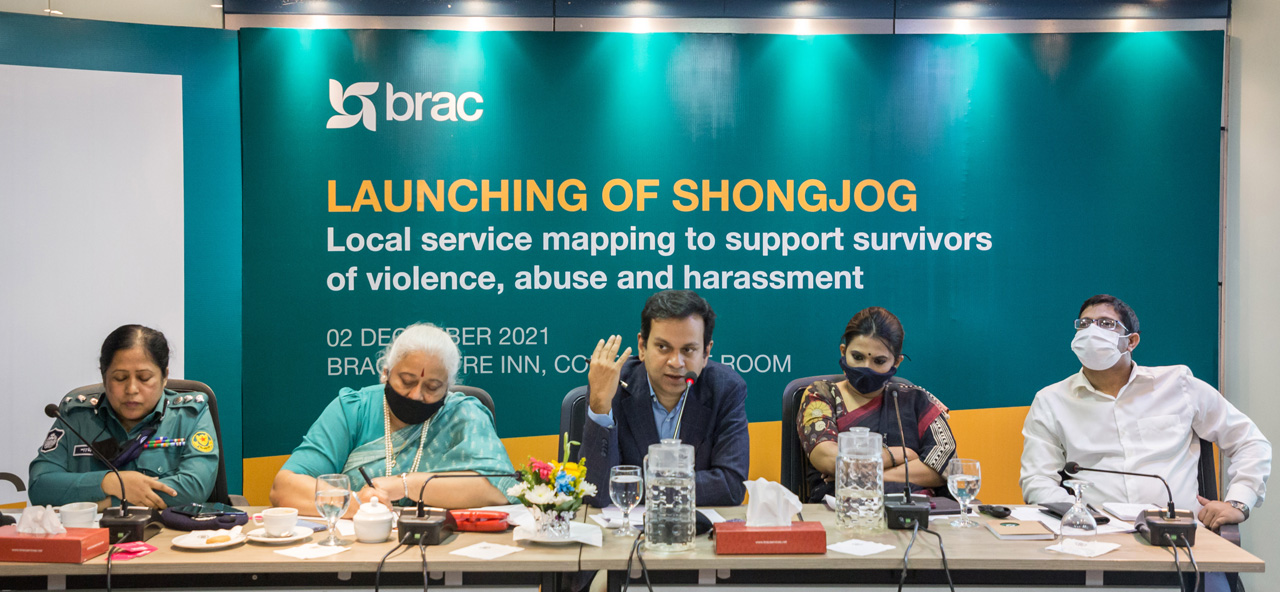
The local service mapping website titled “Shongjog” will offer information on medical, legal, psychosocial and other relevant local services.
BRAC has launched a specially designed database on a user-friendly local service mapping website called “Shongjog” to support survivors of violence to access eight types of necessary information and avail services from state and non-state actors.
The interactive tool that offers name, contact details and other information on service providing agencies was introduced for the public at an event held at the BRAC Centre on Thursday morning, 2 December 2021.
BRAC will offer information on eight types of services from this platform that has been developed based on a mapping conducted in 61 districts covering 435 upazilas across Bangladesh.
Aroma Dutta, member of parliament, and Md Habibur Rahman Chowdhury, deputy director, National Legal Aid Service Organisation (NLASO), attended the event as the chief guest and special guest respectively. Asif Saleh, executive director, and Jenefa Jabbar, director, Social Compliance and Safeguarding, BRAC, also spoke at the event.
The services in the mapping mainly include medical/health services, legal services, psychosocial services, safe/shelter homes, police stations and other necessary local service information for the survivors of violence. Through this website any victims/survivors of abuse, harassment and violence will be able to gain access to information and services designed to assist them to recover from traumatic experiences. It will result in an increased access to the system of government and non-governmental services, expected the organisers.
Appreciating this initiative, lawmaker Aroma Dutta called on all the civil society entities working on women’s rights to join the effort. She suggested BRAC should use the information on this website to develop a data bank to ensure more efficient support for survivors of violence.
NLASO deputy director Md Habibur Rahman Chowdhury assured that initiative will be taken to add details of all the government legal aid offices in different districts to this website. He emphasised the need to bring all the organisations working with survivors of violence under a single umbrella for success of this initiative.
BRAC executive director Asif Saleh said “This initiative will be truly successful only when people will get updated information from this site. But it’s not possible for BRAC only to entirely update it. It needs collaboration from all relevant stakeholders.” He urged all to not consider the website as an initiative solely of BRAC and to make their own contributions so that it becomes successful.
Jenefa Jabbar, director, Social Compliance and Safeguarding, BRAC, said her organisation will collaborate with the government and non-state actors at both the central and local levels to create a wider range of connectivity and referral linkage.
Taslima Yesmin, associate professor, Department. of Law at the University of Dhaka, and representatives from different organisations also attended the event. From BRAC, Tahmina Yesmin, safeguarding lead, Kollol Nag, Head of Platform under Technology Division, Taqbir Huda, advocacy lead for Communications and PVAW at Gender Justice and Diversity Programme, and Shashwatee Biplob, programme head, Social Empowerment and Legal Protection (SELP), were present, among others at the programme.
Change in social psyche must for disability inclusion

Ensuring rights and inclusion of the persons with disabilities is a formidable challenge towards achieving sustainable development. Tackling the challenge summons essential change in the pervasive negative social attitude and collaborative efforts from all including the government and non-governmental entities. Speakers expressed these views at a webinar organised by BRAC today on Tuesday.
The event was organised on the occasion of International Day of Persons with Disabilities (IDPD) to be observed on 3 December. Mahfuza Akhtar, secretary, Ministry of Social Welfare, attended the webinar as chief guest with Sheikh Rafiqul Islam, director general, Department of Social Services, attending as special guest. Asif Saleh, executive director, BRAC, Shafiqul Islam, country director, ADD International, Valerie Taylor, founder, CRP, Dr Morseda Chowdhury, and Maria Huq, directors, BRAC, spoke as panel speakers at the webinar. Rafe Sadnan Adel, head, Media and External Relations, BRAC, moderated the discussion.
The organisers said one-tenth of the country’s total population are persons with different kind of physical and mental disabilities. The overwhelming majority of these people are absent from the mainstream development scenario of the country, mainly owing to different inclusion related issues. Formulation and effective execution of disability-friendly policies are essential to promote inclusion of persons with disabilities in the mainstream development activities and build a sustainable future for them. All have to come together to make it possible.
Asif Saleh, executive director, BRAC, said, “Ideas such as persons with disabilities are people with very limited capacities, or they should not be given higher responsibilities, are very common in our society. We must break these ideas through exemplary development initiatives for persons with disabilities.” There is a lot of scope to work in this area, ensuring the equal rights of the persons with disabilities as the disadvantaged group of our society, he added.
The government is firmly committed to ensure the rights of and opportunities for the persons with disabilities, said Mahfuza Akhtar, secretary, Ministry of Social Welfare. The persons with disabilities need to be motivated about their potentials to become successful and at the same time the society has to change its conventional mindset. Although the government has promulgated laws and rules to safeguard their rights and formed committees in the districts and upazilas, it is, however, not possible for the government to do all that is needed. Collaborative initiatives from the government and the private sectors are essential to bring effective changes, the secretary observed.
Sheikh Rafiqul Islam, director general, Department of Social Services, called on the entrepreneurs, industrialists and private sector employers to provide jobs to the persons with disabilities, besides taking initiatives to create opportunities for them as well as undertaking rehabilitation and skills development initiatives.
ADD International country director Shafiqul Islam said, “The laws of Bangladesh safeguard the right of the persons with disabilities to access employment and safeguard them against discriminatory practices. The government is legally and politically committed to the cause, but it is not possible for the government alone to implement those rights. It needs coordinated and active participation from the persons with disabilities and the organisations that work with them.”
Having highlighted the exemplary successes of persons with disabilities in their jobs, CRP founder Valerie Taylor viewed that changes are happening now. “But the changes need to be speedier and it would be great if we all can be stakeholders to bring the change.”
BRAC Human Resource Division director Maria Huq mentioned a range of measures undertaken by BRAC to establish a disability-friendly workplace, and said the organisation has set a target to appoint 900 persons with disabilities as its staff by 2025.
BRAC Health, Nutrition and Population Programme director Dr Morseda Chowdhury observed that initiatives to give soft skills training to persons with disabilities are still few in Bangladesh. Having stressed that measures should be taken for both soft and hard skills training for them, she called on all to take collaborative efforts to ensure equal opportunities for and dignity of the persons with disabilities at the workplace.
BRAC, H&M Foundation and The Asia Foundation launch the Global Innovation Challenge inviting RMG-based solutions
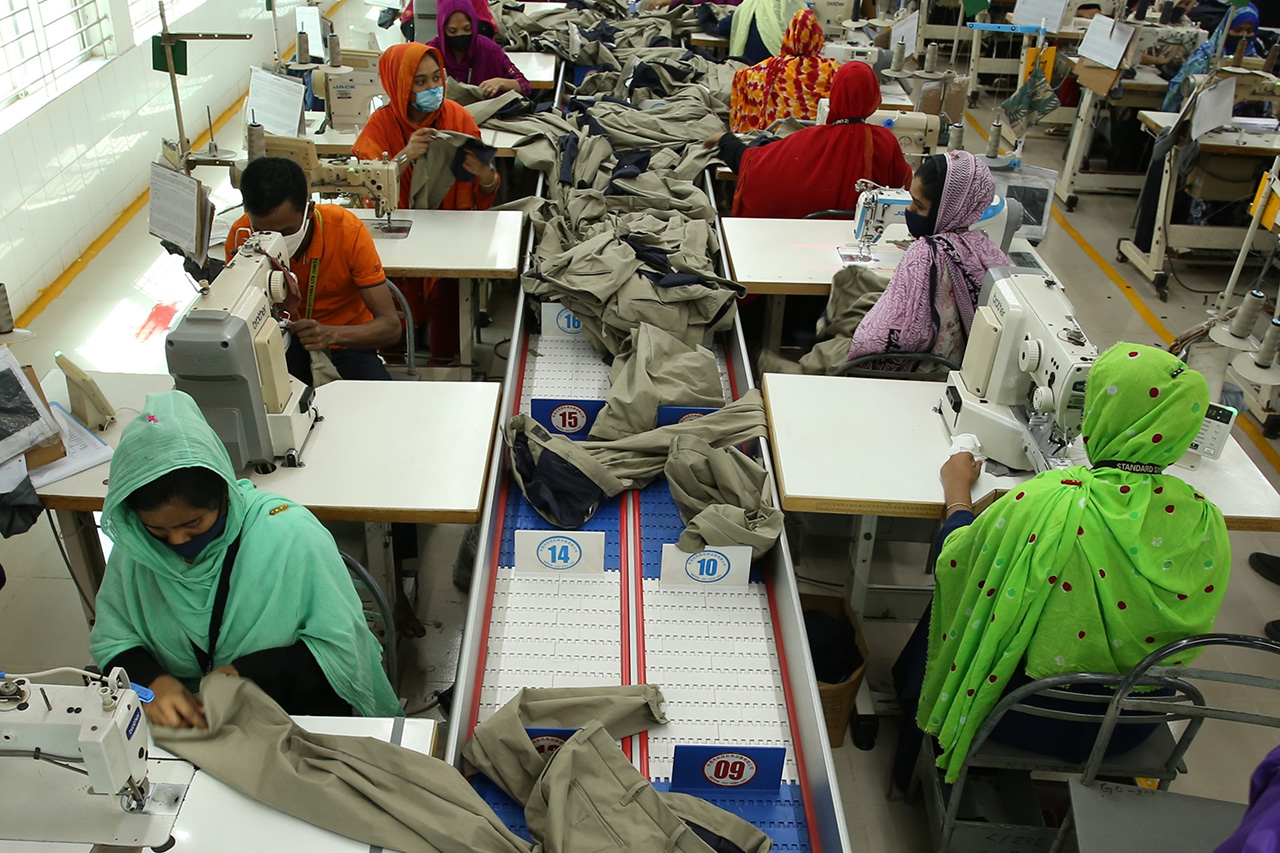
Six winners to receive a fund up to $30,000 and incubation support for pilot implementation.
SITICH for RMG, a pilot project undertaken by BRAC Social Innovation Lab, H&M Foundation and The Asia Foundation, has launched the international virtual competition to find solutions for safeguarding the women in RMG in Bangladesh and increase the competitiveness of factories. Innovators from around the world are welcome to submit viable solutions incorporating these key issues. Applications are now open and to be submitted by 25 November 2021.
Entrepreneurs can submit ideas under five thematic areas – Automation and Efficiency; Sustainability and Circular Fashion; Product Design, Diversification, and Raw Material; Skill Development and Women’s Career; and, Enabling Environment. The themes have been identified through many dialogues centering the STITCH for RMG: Global Innovation Conference in June 2021 that brought together over 450 RMG buyers, suppliers, industry experts, and tech innovators.
“Defining the problem is 90% of the solution. We need to reach the experts, those who already are working with workable solutions, seek their help and guidance then scale up the solution-oriented prototypes through hackathons.” – K A M Morshed, Senior Director, Advocacy for Social Change, Migration, Partnership Strengthening Unit, Social Innovation Lab, Technology, BRAC.
The competition is free to participate and welcomes ideas as well as innovations in ready prototype, pre-commercial, and post-commercial stages. Three rounds viz. the Concept Round, Pitching Round & Marketplace Round will entice written application, virtual pitching through video submission, and interaction with RMG suppliers for joint submission of Expression of Interests (EOIs). Winning six ideas will move on to the pilot execution and incubation phase. Interested innovators have to form a team of 2-3 members and submit their ideas through brac.us.skipsolabs.com/en/login/page.
“There is a real need for new approaches to support women in the future garment industry. We have high hopes that the STITCH for RMG Global Innovation Challenge will result in innovations that have the potential to improve the industry competitiveness and livelihood of the women garment workers. Our long-term goal here is to prepare and equip the women to work successfully alongside AI and automation, and by this safeguard their livelihoods” says Charlotte Brunnström, Strategy Lead at H&M Foundation.
Learn more about the Global Innovation Challenge at stitchforrmg.brac.net/innovation-challenge.
Covid-19 yearbook 2020: Bangladesh tackled pandemic with coordinated effort
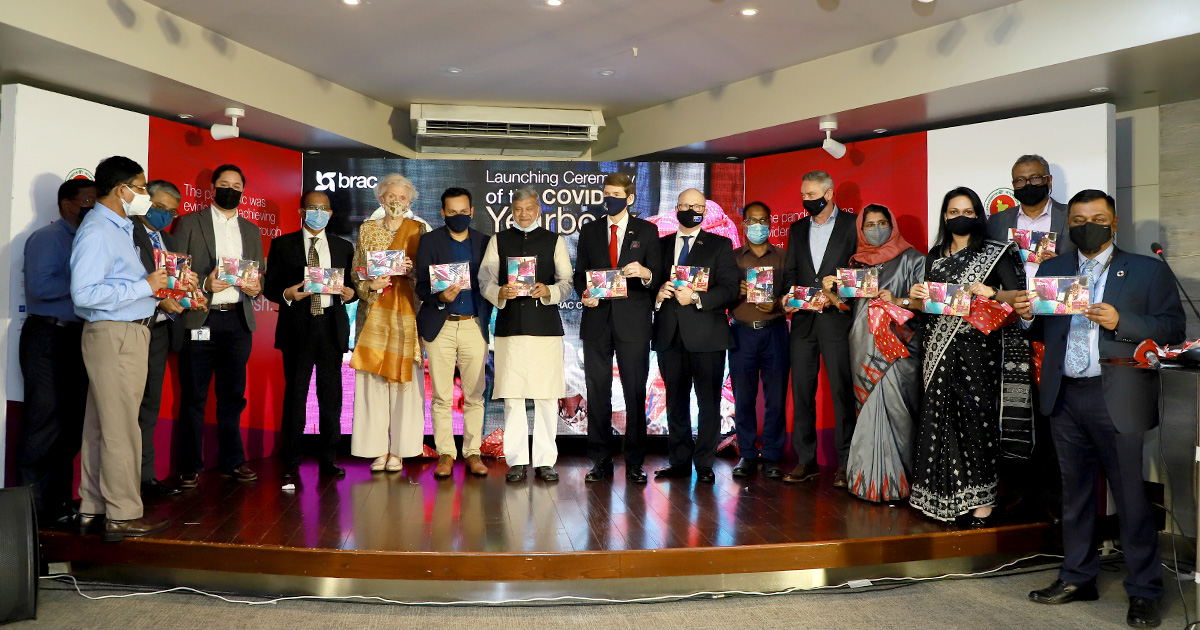
Bangladesh has set an example of successfully tackling disasters through coordinated efforts by the government, development and private actors, donors and corporate bodies to overcome the impacts of Covid-19.
Speakers at a discussion programme made these observations at an event today on Thursday afternoon (28 October) to publish “Covid-19 yearbook 2020”. Development organisation BRAC organised the programme.
BRAC’s senior director KAM Morshed moderated the event, where Planning minister M A Mannan graced the event as the chief guest.
In his remarks as the chief guest, M A Mannan said, “If it (Covid-19) waves again in future, we will work together under the direction of the Prime Minister Sheikh Hasina in a combined approach.” He also hoped the government and non-government organisations will work in a partnership model to attain sustainable development of the country.
BRAC Health Nutrition and Population Programme (HNPP) director Morseda Chowdhury presented a summary of “Covid-19 yearbook 2020” at the programme. She said the challenges along with the learnings and experiences gathered in this great crisis faced by the nation in the present global health disaster have found their place in this book. BRAC hopes this documentation will help as a reference for both BRAC and other organisations in tackling similar crises in future.
BRAC Executive Director Asif Saleh in his welcome speech thanked partner agencies saying the existing relation of trust between the government and the private sector in combating Covid-19 is very promising. This partnership can play a major role in combating disasters in future.
Embassy of the United States ambassador to Bangladesh Earl R. Miller said “I am proud of the partnership between the embassy with the Bangladesh government, BRAC and other organisations who are fighting against this pandemic.”
Australian High Commissioner to Bangladesh Jeremy Bruer said the way in which BRAC was able to respond to support the needs of the people of this country was truly exemplary.
Nazmul Haque Khan, Additional Secretary (Hospital Wing), Health Service Division, said coordinated effort is the only way to fight any disaster and this is what has happened with the Covid-19 prevention activities. He hoped to continue such endeavors in future.
Urging everyone to unite for action in Covid-19 prevention, Dr. Md. Ashfaqul Islam Babul, Director (Project-1) [Joint Secretary] of NGO Affairs Bureau under Prime Minister’s Office said service delivery is needed at the very doorstep of the margnialised people and this is why we need to bolster the existing partnership further.
Unilever Bangladesh Chief Executive Officer (CEO) Zaved Akhtar, Grameenphone Chief Financial Officer Jens Becker, Senior Development Officer of Canadian High Commission Joe Landry and Development Director of Foreign, Commonwealth and Development Office of the UK government Judith Herbertson also spoke at the ceremony.
The speakers expressed honour and recognised the efforts and sacrifices of the frontliners who have risked their life and worked relentlessly to tackle the pandemic. They also pledged to continue acting as a united force against the pandemic.
BRAC-Dutch development bank financing partnership of USD 50m: A milestone in microfinance to improve life of the underserved
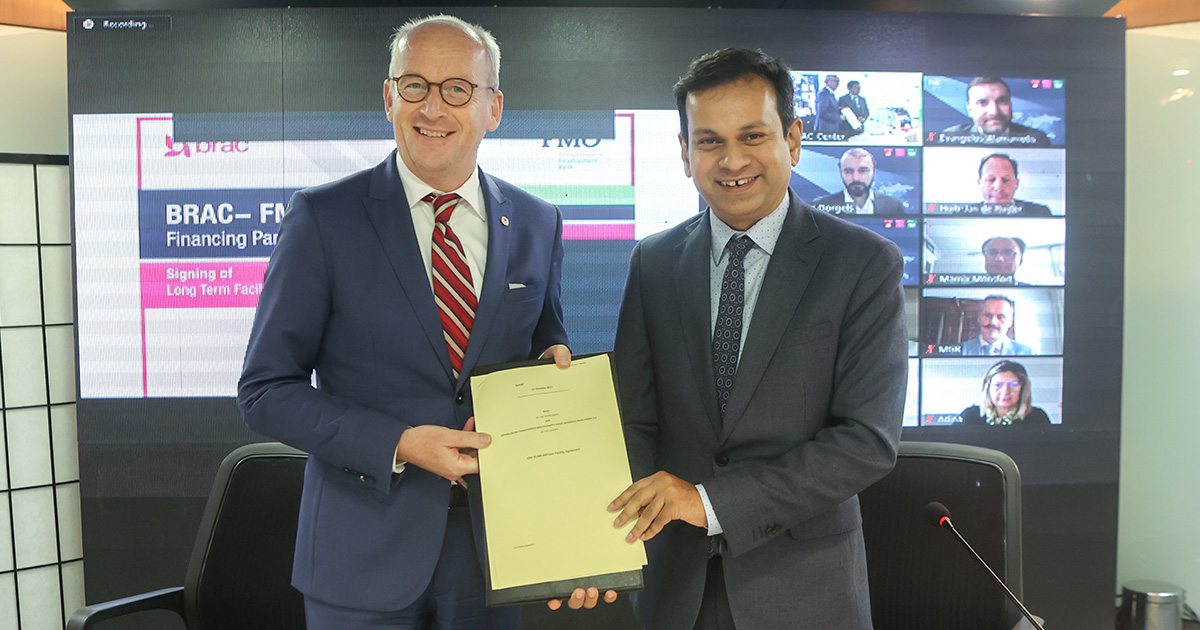
BRAC, the world’s number one non-governmental organisation, and FMO, an entrepreneurial development bank from the Netherlands, have set a milestone by entering a financing partnership worth USD 50 million, as it is the first ever direct lending to any microfinance institution of Bangladesh by any international financing institution.
BRAC obtained the fund as a 5-year long credit facility in April in current year to support its microfinance programme, speakers said today on Wednesday (27 October) at a ceremony, delayed to arrange due to the pandemic, organised at BRAC Centre in Mohakhali in Dhaka.
The entire fund is earmarked for financing of the microfinance portfolio of BRAC. The financing has been made in full compliance of the existing laws of Bangladesh.
The ceremony was physically attended by Mr Anne van Leeuwen, ambassador, and Mr Bas Blaauw, first secretary of the Kingdom of the Netherlands to Bangladesh. Mr Asif Saleh, executive director, BRAC, led the representation from BRAC at the event. Mr Tushar Bhowmik, CFO, Ms Moutushi Kabir, director, communications, Mr Sahed Shams Azad, chief operating officer, Microfinance Programme were also present from BRAC at the ceremony. K Mahmood Sattar, chairman, RSA Capital, was also present at the function. The FMO team was virtually present at the event.
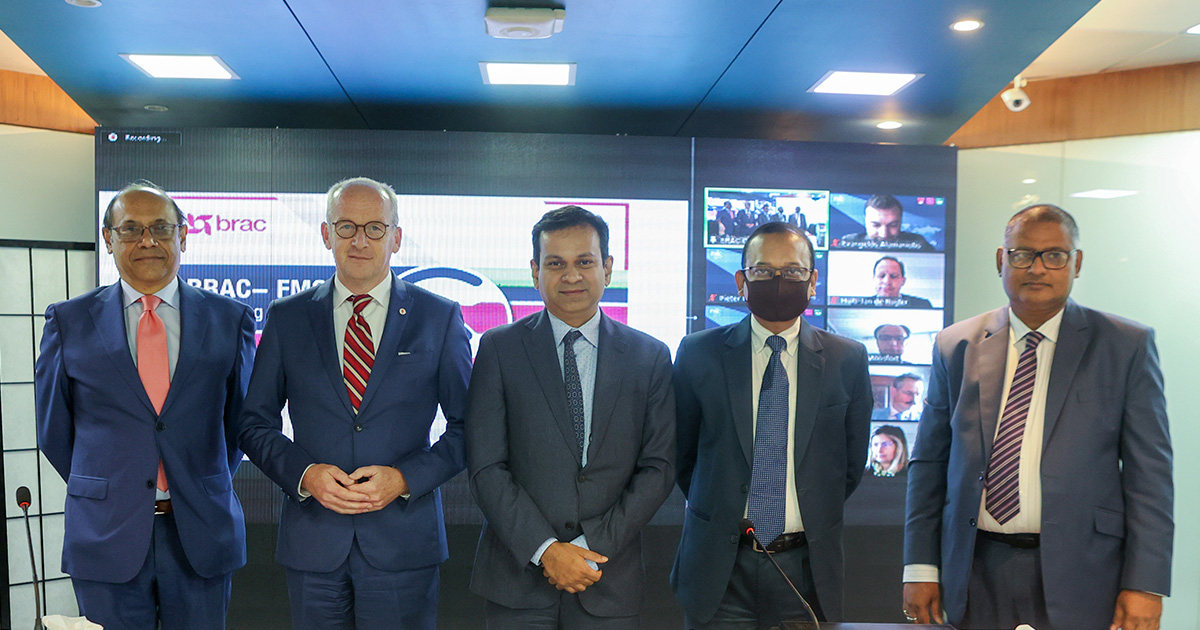
Anne van Leeuwen, ambassador of Kingdom of the Netherlands to Bangladesh said, “Bangladesh has been a real champion in 50 years of independence, and BRAC has been the partner in this journey by combating poverty, doing great in the education and health sector. Bangladesh has the longest experience in Microfinance. I feel, by strengthening the Microfinance in this way, we can impact millions of peoples’ lives out of poverty.”
Asif Saleh, executive director, BRAC said, “The Netherland government has been a great partner in many of our education and Water,Sanitation and Hygiene programmes. BRAC Microfinance programme has been playing a big role during the time of pandemic and recovery of the economy from this pandemic. We are glad that FMO came to us during this challenging time and I am appreciative of this financial partnership and partnership of trust.”
“We are delighted to receive this investment from FMO. It is a milestone achievement for the microfinance sector as a foreign bank is directly investing in a microfinance institution in Bangladesh for the first time,” said Tushar Bhowmik, BRAC’s CFO.
“The investment will help improve the livelihoods of people who need access to affordable financial solutions, especially in marginalised communities, in a more efficient way,” he added.
“We are thrilled to re-establish our partnership with BRAC in Bangladesh by supporting their microfinance activities. The organisation’s mission and vision closely resonate with FMO’s own agenda of achieving financial inclusion. The USD 50 million loan facility will bring funding stability to the balance sheet of BRAC during a time of increasing uncertainty brought by the pandemic, and we believe it can act as a signal for more investments to take place in the microfinance sector,” said Mr Huib-Jan de Ruijter, chief investment officer of FMO.
This investment aligns with the FMO’s inclusive strategy in Bangladesh as more than 50% of the loan portfolio of BRAC supports micro-enterprise loans (< 10,000 EUR), mentions an FMO statement.
The investment will help improve the livelihoods of the people who need access to affordable financial solutions, especially in the underserved and marginalised communities, said the speakers. It will also help accelerate the drive for innovations of affordable solutions to facilitate financial inclusion of women and other underserved and marginalised sections of people, they added.
Speakers from BRAC expressed hope that the successful closure of this deal paved the way for such partnerships in future, expecting further strengthening the partnership with FMO.
Currently, BRAC is the market leader for the microfinance sector in Bangladesh with a microfinance loan portfolio of $3.2 billion serving more than 7.4 million customers, among whom 85% are women, in more than 69,000 villages.
‘Safe Back to School’ campaign
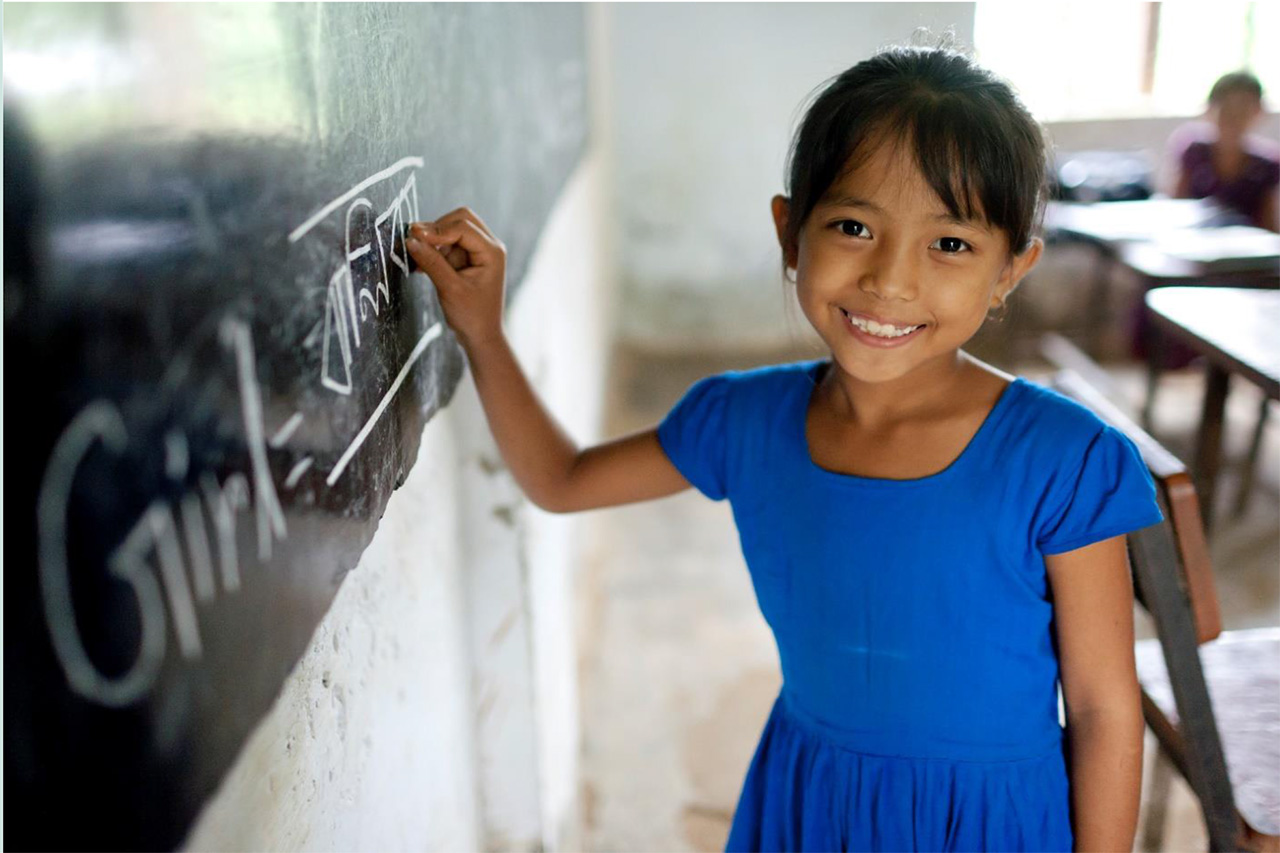
Joint campaign of nineteen development partners on children safety cover more than 10 thousand schools
The ‘Safe Back to School’ alliance is running a campaign with the government to raise awareness on behavioural change among children, ensuring that they comply with Covid-19 health advisories in schools.
Besides the countrywide awareness campaign using messaging through different channels, the alliance members are also implementing diverse activities in more than 10 thousand schools across 56 districts to promote behavioural change in children to help them grow habits to follow the Covid-19 precautions.
The government and its stakeholders took children safety as their top priority before the educational institutions were re-opened on September 12 to make sure that children return to and continue school with all kinds of protection against Covid-19. To drive the effort 19 national and international development organisations launched ‘Safe Back to School’ campaign on 10 February this year.
Alongside the government, the campaign is leveraging all the available mediums of communication to create countrywide awareness to ensure safe return and safe learning environment for children in schools. The implementing partners today, Tuesday, briefed the current activities and future plan of the campaign at a press conference at the National Press Club in Dhaka.
BRAC’s senior director KAM Morshed, on behalf of the implementing partners, told the press conference that the campaign has been particularly designed to disseminate messages to all children and their families through all possible communication channels. “We are using all the available mediums of communication – mass media, social media and word of mouth. These messages are promoting behaviour change in children to help them adopt the Covid-19 precautions of handwashing, mask wearing, social distancing as habits,” said KAM Morshed.
Communications manager at World Vision Bangladesh Devashish Ranjan Sarker moderated the event, while Save the Children in Bangladesh senior manager (media and communications) Nusrat Amin briefed on the different contents developed under the campaign. The contents, among others, include an audio-visual advertisement by popular band group Joler Gaan themed on awareness messaging for children to be aired soon on television channels and social media.
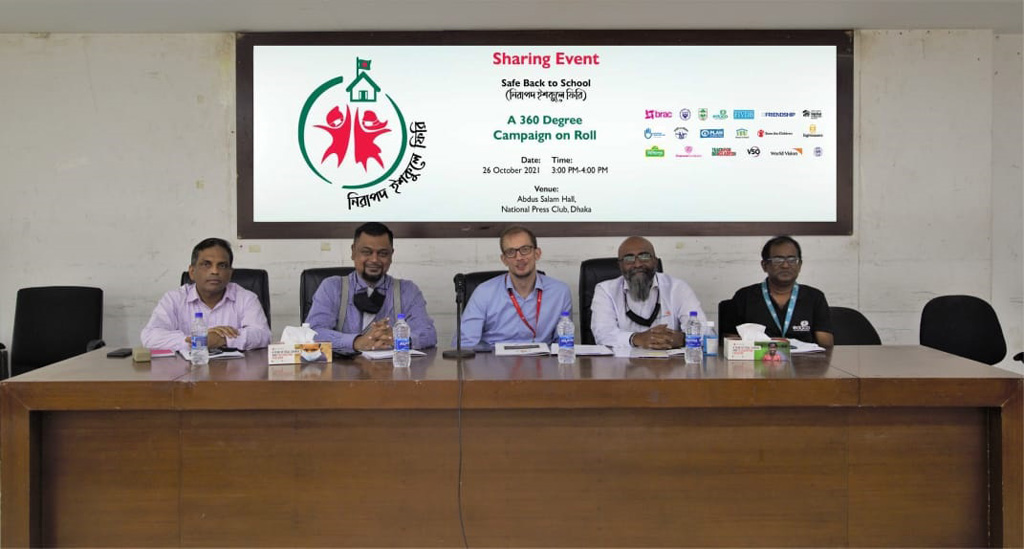
Country Coordinator of Stromme Foundation Mizanur Rahman said the alliance is working as a catalyst to make a bridge between the government and the marginalized people so that the demands of marginalized reaches the government and the messages by the government reaches the masses properly.
Coordinated initiative and planning between the government, non-government organisations and the mass media is required to get those children back to regular schooling, who are left behind due to family or social situations or financial constraints, said Golam Kibria, head of education at Educo Bangladesh.
Save the Children in Bangladesh country director Onno Van Manen requested mass media to highlight different contents on the need for importance of education to encourage children to return to school to recover last one year and a half’s Covid-19 induced learning loss.
Tony Michael Gomes, director (Communications, Advocacy) at World Vision Bangladesh, said all the alliance members working in the field of education is making sure that the available resource are mobilised to keep the schools safe.
Samia Ahmed, senior manager (advocacy and campaign) at Save the Children in Bangladesh, and Rafe Sadnan Adel, head of media and external relations at BRAC was also present at the programme.
Alongside the awareness campaign, the alliance members are also implementing diverse activities with special focus on the schools in remote areas. These activities include Covid-19 safety training for teachers of remote schools; distribution of masks, hand wash and education materials, thermal detector at schools; advice on keeping schools clean; assistance to children of families in extreme poverty to get back to school; advocacy with school management committee and community leaders on school safety; and door-to-door campaign and courtyard meetings with guardians to send children to school.
The organisations running the campaign are - BRAC, Campaign for Popular Education, Dhaka Ahsania Mission, Educo Bangladesh, FIVDB, Friendship, Habitat for Humanity Bangladesh, Handicap International – Humanity & Inclusion, Jagoroni Chakra Foundation, Plan International Bangladesh, Room to Read Bangladesh, Save the Children in Bangladesh, Sightsavers Bangladesh, Sesame Workshop Bangladesh, Stromme Foundation, Teach for Bangladesh, VSO, World Vision Bangladesh and YPSA.
Join the world’s biggest family

